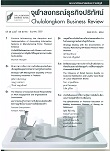The Influence of Corporate Social Responsibility on Work Engagement and Organizational Commitment*
Main Article Content
Abstract
Abstract
We analyze how different bundles of Corporate Social Responsibility (CSR) activities lead to different degree of work engagement and organization commitment of the employees in that organization. Based on human resource development and CSR literatures, we argue that measuring CSR performance on employee is more appropriate and relevant to company performance than merely measuring CSR effect on company financial performance. On top of that CSR is recently viewed as Corporate Stakeholder Responsibility, employee is core stakeholder who contribute to company competitive advantage. Though there are a few extant researchers on CSR and employee engagement, they treated employee perception towards the term CSR per se. However, how CSR defined by employees could be different from the one defined by executives. Our study filled in this gap by measuring the influence of employee perception towards CSR activities bundles that the company—for which they are working—sponsored, and level of work engagement and organization commitment in both long run and short run. It suggests that people who are working for company that conduct CSR at the minimum level required by law and regulation has the lowest degree of work engagement and organization commitment while employees in the company that conduct CSR in an integrative manner express high level of both work engagement and organization commitment. Implication from the findings is twofold. One is CSR could be effective tools to retain employees in the organization if conducted in a well-designed and seriously planned manner. The other is communicating CSR to employee is probably as crucial as communicating to the public. The latter could increase company reputation as good corporate citizenship, but the former could contribute directly to human resource management cost, and thus, company financial performance.
Keywords: corporate social responsibility; CSR; work engagement; organizational commitment
บทคัดย่อ
การศึกษาครั้งนี้ได้ทำการวิเคราะห์ว่าส่วนผสมของกิจกรรมความรับผิดชอบต่อสังคมที่บริษัทได้จัดทำนั้นมีผลต่อความผูกพันในงานและความยึดมั่นในองค์กรอย่างไร ผู้วิจัยได้ศึกษาวรรณกรรมด้านการบริหารงานบุคคลและความรับผิดชอบต่อสังคมและพบว่าการวัดผลของกิจกรรมความรับผิดชอบต่อสังคมต่อพนักงานนั้นมีความเหมาะสมและเกี่ยวข้องกับการดำเนินงานของบริษัทมากกว่าจะวัดผลของกิจกรรมดังกล่าวต่อผลการประกอบการของบริษัทโดยตรง นอกจากนี้ วรรณกรรมด้านความรับผิดชอบต่อสังคมได้มีแนวโน้มที่จะให้ความสำคัญกับผู้มีส่วนได้ส่วนเสียมากขึ้น พนักงานบริษัทก็เป็นผู้มี่ส่วนได้ส่วนเสียคนสำคัญ อย่างไรก็ดี แม้จะมีงานวิจัยเกี่ยวกับผลของกิจกรรมความรับผิดชอบต่อสังคมของบริษัทต่อความผูกพันในงานและความยึดมั่นในองค์กร งานวิจัยเหล่านั้นวัดการรับรู้ของพนักงานต่อคำว่า”ความรับผิดชอบต่อสังคมของบริษัท” ดังนั้น จึงอาจจะเป็นไปได้ว่าพนักงานและบริษัทตีความความหมายของคำนี้แตกต่างกัน งานศึกษาครั้งนี้วัดการรับรู้เกี่ยวกับส่วนผสมของกิจกรรมความรับผิดชอบต่อสังคมที่บริษัทที่ตนเองได้ทำงานอยู่กับความผูกพันในงานและความยึดมั่นต่อองค์กรทั้งในระยะสั้นและระยะยาว ผลการศึกษาพบว่าบริษัทที่ทำกิจกรรมความรับผิดชอบต่อสังคมเพียงแค่การทำตามกฎหมายและข้อบังคับจะทำให้พนักงานมีระดับความผูกพันในงานและความยึดมั่นต่อองค์กรในระดับต่ำ ในขณะที่บริษัทที่ทำกิจกรรมความรับผิดชอบต่อสังคมอย่างผสมผสานจะมีระดับความผูกพันในงานและความยึดมั่นต่อองค์กรสูงกว่าในทุก ๆ ด้าน ผลการศึกษานี้ทำให้เห็นว่าการทำกิจกรรมความรับผิดชอบต่อสังคมสามารถใช้เป็นเครื่องมือที่สำคัญในการรักษาบุคคลากรในองค์กรหากออกแบบและวางแผนเป็นอย่างดี บริษัทจึงควรสื่อสารกิจกรรมความรับผิดชอบต่อสังคมของบริษัทให้กับพนักงานด้วยเพื่อให้บุคคลากรได้เข้าใจและติดตามกิจกรรมของบริษัท เพิ่มความผูกพันในงานและความยึดมั่นต่อองค์กร ลดต้นทุนในการบริหารงานบุคคลและเพิ่มผลประกอบการของบริษัทในที่สุด
คำสำคัญ: กิจกรรมความรับผิดชอบต่อสังคมขององค์กร; ความผูกพันในงาน ความยึดมั่นต่อองค์กร
Article Details
Opinions and discussions in papers published by the Creative Business and Sustainability Journal (CBSJ) are deemed as personal opinions and the responsibility of the writers. They are not the opinions or responsibility of the Chulalongkorn Business School of Chulalongkorn University.
Papers, content, information etc. appearing in the Journal are deemed to be the copyright property of the Chulalongkorn Business School of Chulalongkorn University. Anybody or any organization that wishes to publish any part of them or use them in any way must obtain written permission from the Chulalongkorn Business School, Chulalongkorn University.


